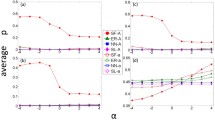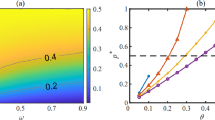Abstract
In reality, most individuals are prone to vary strategies when interacting with their counterparts; thus, it is highly likely that different strategies will be applied when confronting with different players, being referred to as interactive diversity. Numerous scholars have devoted their endless efforts into the investigation of the emergence and maintenance of cooperation for interactive diversity scenarios and this becomes an interesting research topic recently. However, evolutionary dynamics of such games still needs to be further studied. Here, a co-evolving mechanism is proposed aiming to study the effects of applying different updating rules on the level of cooperation when considering interactive diversity. Teaching and learning updating rules are considered in the co-evolving mechanism. Then, we have done extensive experiments and corresponding simulation results are provided. Sufficient analyses of the simulation results are given in order to understand the origin of the observed experimental phenomena. We find the fact that with the increase of the proportion of Type-T players, individuals start to adopt the strategy of cooperation even if the temptation to defect is relatively large; this indicates players are inclined to cooperate under such scenario. All in all, we hope the findings in this manuscript are capable of providing some valuable and interesting insights to solve the social dilemmas.
Graphic abstract






Similar content being viewed by others
Data Availability Statement
This manuscript has no associated data or the data will not be deposited. [Authors’ comment: The data can be obtained through the MC simulations which is performed according to the mechanism provided in this manuscript.]
Change history
09 April 2021
An Erratum to this paper has been published: https://doi.org/10.1140/epjb/s10051-021-00082-2
References
K. Sigmund, The calculus of selfishness (Princeton University Press, Princeton, 2016)
M.A. Nowak, K. Sigmund, Evolutionary dynamics of biological games. Science 303(5659), 793–799 (2004)
G. Szabó, G. Fath, Evolutionary games on graphs. Phys. Rep. 446(4–6), 97–216 (2007)
M. Perc, J.J. Jordan, D.G. Rand et al., Statistical physics of human cooperation. Phys. Rep. 687, 1–51 (2017)
H. Ohtsuki, M.A. Nowak, The replicator equation on graphs. J. Theor. Biol. 243(1), 86–97 (2006)
C.P. Roca, J.A. Cuesta, A. Sánchez, Evolutionary game theory: temporal and spatial effects beyond replicator dynamics. Phys. Life Rev. 6(4), 208–249 (2009)
Y. Han, Z. Song, J. Sun et al., Investing the effect of age and cooperation in spatial multigame. Phys. A 541, 123269 (2020)
M.A. Nowak, R.M. May, Evolutionary games and spatial chaos. Nature 359(6398), 826–829 (1992)
D. Vilone, V. Capraro, J.J. Ramasco, Hierarchical invasion of cooperation in complex networks. J. Phys. Commun. 2(2), 025019 (2018)
M.G. Zimmermann, V.M. Eguíluz, Cooperation, social networks, and the emergence of leadership in a prisoner’s dilemma with adaptive local interactions. Phys. Rev. E 72(5), 056118 (2005)
P. Zhu, H. Guo, H. Zhang et al., The role of punishment in the spatial public goods game. Nonlinear Dyn. 102(4), 2959–2968 (2020)
M. Mosleh, D.G. Rand, Population structure promotes the evolution of intuitive cooperation and inhibits deliberation. Sci. Rep. 8(1), 1–8 (2018)
X. Li, M. Jusup, Z. Wang et al., Punishment diminishes the benefits of network reciprocity in social dilemma experiments. Proc. Natl. Acad. Sci. 115(1), 30–35 (2018)
J.M. Pacheco, A. Traulsen, H. Ohtsuki et al., Repeated games and direct reciprocity under active linking. J. Theor. Biol. 250(4), 723–731 (2008)
H. Ohtsuki, Y. Iwasa, The leading eight: social norms that can maintain cooperation by indirect reciprocity. J. Theor. Biol. 239(4), 435–444 (2006)
Z. Wang, M. Jusup, L. Shi et al., Exploiting a cognitive bias promotes cooperation in social dilemma experiments. Nat. Commun. 9(1), 1–7 (2018)
A. Szolnoki, M. Perc, Vortices determine the dynamics of biodiversity in cyclical interactions with protection spillovers. New J. Phys. 17(11), 113033 (2015a)
J. Shi, D. Hu, R. Tao et al., Interaction between populations promotes cooperation in voluntary prisoner’s dilemma. Appl. Math. Comput. 392, 125728 (2021)
C. Liu, H. Guo, Z. Li et al., Coevolution of multi-game resolves social dilemma in network population. Appl. Math. Comput. 341, 402–407 (2019)
X.P. Li, S.W. Sun, C.Y. Xia, Reputation-based adaptive adjustment of link weight among individuals promotes the cooperation in spatial social dilemmas. Appl. Math. Comput. 361, 810–82 (2019)
J. Liu, H. Meng, W. Wang et al., Synergy punishment promotes cooperation in spatial public good game. Chaos Solitons Fractals 109, 214–218 (2018)
C.Y. Xia, X.P. Li, Z. Wang, M. Perc, Doubly effects of information sharing on interdependent network reciprocity. New J. Phys. 20(7), 0750025 (2018)
C. Chu, X. Hu, C. Shen et al., Self-organized interdependence among populations promotes cooperation by means of coevolution. Chaos 29(1), 013139 (2019)
X.P. Li, H.B. Wang, C.Y. Xia, M. Perc, Effects of reciprocal rewarding on the evolution of cooperation in voluntary social dilemmas. Front. Phys. 7, 125 (2019)
M. Perc, A. Szolnoki, Coevolutionary games–a mini review. BioSystems 99(2), 109–125 (2010)
A. Szolnoki, M. Perc, Promoting cooperation in social dilemmas via simple coevolutionary rules. Eur. Phys. J. B 67(3), 337–344 (2009)
C. Vertebrates, Breeding together: Kin selection and mutualism. Science 296, 69 (2002)
M.A. Nowak, Five rules for the evolution of cooperation. Science 314(5805), 1560–1563 (2006)
S.A. West, A.S. Griffin, A. Gardner, Social semantics: altruism, cooperation, mutualism, strong reciprocity and group selection. J. Evol. Biol. 20(2), 415–432 (2007)
M.A. Nowak, K. Sigmund, Evolution of indirect reciprocity by image scoring. Nature 393(6685), 573–577 (1998)
F.C. Santos, J.M. Pacheco, T. Lenaerts, Evolutionary dynamics of social dilemmas in structured heterogeneous populations. Proc. Natl. Acad. Sci. 103(9), 3490–3494 (2006)
B. Allen, G. Lippner, Y.T. Chen et al., Evolutionary dynamics on any population structure. Nature 544(7649), 227–230 (2017)
P. Zhu, Z. Song, H. Guo et al., Adaptive willingness resolves social dilemma in network populations. Chaos 29(11), 113114 (2019)
A. Szolnoki, G. Szabó, Diversity of reproduction rate supports cooperation in the prisoner’s dilemma game on complex networks. Eur. Phys. J. B 61, 505–509 (2008)
A. Szolnoki, G. Szabó, Cooperation enhanced by inhomogeneous activity of teaching for evolutionary Prisoner’s Dilemma games. Europhys. Lett. 77(3), 30004 (2007)
A. Szolnoki, X. Chen, Gradual learning supports cooperation in spatial prisoner’s dilemma game. Chaos Solitons Fractals 130, 109447 (2020)
A. Szolnoki, X. Chen, Strategy dependent learning activity in cyclic dominant systems. Chaos Solitons Fractals 138, 109935 (2020)
A. Szolnoki, M. Perc, Coevolution of teaching activity promotes cooperation. New J. Phys. 10(4), 043036 (2008)
J. Vukov, G. Szabó, A. Szolnoki, Cooperation in the noisy case: prisoner’s dilemma game on two types of regular random graphs. Phys. Rev. E 73(6), 067103 (2006)
Z. Danku, Z. Wang, A. Szolnoki, Imitate or innovate: competition of strategy updating attitudes in spatial social dilemma games. Europhys. Lett. 121(1), 18002 (2018)
A. Szolnoki, M. Perc, Conformity enhances network reciprocity in evolutionary social dilemmas. J. R. Soc. Interface 12(103), 20141299 (2015)
A. Szolnoki, M. Perc, Leaders should not be conformists in evolutionary social dilemmas. Sci. Rep. 6, 23633 (2016)
L. Gao, Q. Pan, M. He, Changeable updating rule promotes cooperation in well-mixed and structured populations. Phys. A 547, 124446 (2020)
A. Szolnoki, Z. Danku, Dynamic-sensitive cooperation in the presence of multiple strategy updating rules. Phys. A 511, 371–377 (2018)
D. Jia, X. Wang, Z. Song et al., Evolutionary dynamics drives role specialization in a community of players. J. R. Soc. Interface 17(168), 20200174 (2020)
A. Szolnoki, M. Perc, Coevolutionary success-driven multigames. Europhys. Lett. 108(2), 28004 (2014)
G. Szabó, A. Szolnoki, J. Vukov, Selection of dynamical rules in spatial prisoner’s dilemma games. Europhys. Lett. 87(1), 18007 (2009)
H. Takesue, Effects of updating rules on the coevolving prisoner’s dilemma. Phys. A 513, 399–408 (2019)
P. Zhu, X. Wang, D. Jia et al., Investigating the co-evolution of node reputation and edge-strategy in prisoner’s dilemma game. Appl. Math. Comput. 386, 125474 (2020)
Q. Su, A. Li, L. Wang, Evolutionary dynamics under interactive diversity. New J. Phys. 19(10), 103023 (2017)
X. Wang, G. Zhang, W. Kong, Evolutionary dynamics of the prisoner’s dilemma with expellers. J. Phys. Commun. 3(1), 015011 (2019)
M. Perc, A. Szolnoki, Social diversity and promotion of cooperation in the spatial prisoner’s dilemma game. Phys. Rev. E 77(1), 011904 (2008)
G. Ichinose, Y. Satotani, H. Sayama, How mutation alters the evolutionary dynamics of cooperation on networks. New J. Phys. 20(5), 053049 (2018)
M. Pereda, V. Capraro, A. Sánchez, Group size effects and critical mass in public goods games. Sci. Rep. 9, 5503 (2019)
Acknowledgement
This work was supported in part by Science and Technology Innovation 2030 “New Generation Artificial Intelligence” Major Project (Grant no. 2020AAA0107704), Technology-Scientific and Technological Innovation Team of Shaanxi Province (Grant no. 2020TD-013), National Natural Science Foundation of China (Grant no. 62073263, 61866039), National Key Scientific Research Project (Grant nos. MJ-2016-S-42, MJ-2018-S-34), Shaanxi Science and Technology Program (Grant no. 2019PT-03).
Author information
Authors and Affiliations
Corresponding author
Rights and permissions
About this article
Cite this article
Zhu, P., Hou, X., Guo, Y. et al. Investigating the effects of updating rules on cooperation by incorporating interactive diversity. Eur. Phys. J. B 94, 58 (2021). https://doi.org/10.1140/epjb/s10051-021-00059-1
Received:
Accepted:
Published:
DOI: https://doi.org/10.1140/epjb/s10051-021-00059-1




